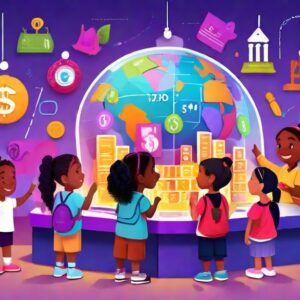In today’s complex financial landscape, it is essential for every adult to prioritize financial literacy. Understanding the principles of money management, investment strategies, and budgeting empowers individuals to make informed decisions that can positively impact their daily lives.
By acquiring financial knowledge, individuals gain the confidence and skills necessary to navigate the intricacies of personal finance and achieve their long-term financial goals.
In this article, we will explore the importance of financial education, its impact on daily life, and the benefits of prioritizing financial literacy.

Key Takeaways
- Financial education equips adults with skills and knowledge for informed money management and financial planning.
- Prioritizing financial literacy promotes financial security and independence.
- Financial education helps individuals understand the importance of saving and investing, leading to wealth growth over time.
- Enhancing financial literacy enhances career prospects and job market competitiveness.
The Importance of Financial Education
The importance of financial education lies in equipping adults with the necessary skills and knowledge to make informed decisions about money management and financial planning. In today’s complex economic landscape, it is crucial for individuals to understand concepts like budgeting, saving, investing, and debt management.
Financial education provides individuals with the tools they need to navigate financial challenges and opportunities, promoting financial security and independence. By learning about topics such as interest rates, credit scores, and retirement planning, adults can better plan for their future, avoid costly mistakes, and achieve their financial goals.
Moreover, financial education empowers individuals to make informed choices about their finances, fostering a sense of control and freedom over their economic well-being. Understanding the importance of financial education sets the stage for exploring how financial literacy impacts daily life.
How Financial Literacy Impacts Daily Life
Financial literacy impacts daily life by providing individuals with the knowledge and skills needed to make sound financial decisions and effectively manage their money. It equips people with the understanding of basic financial concepts such as budgeting, saving, investing, and debt management. This knowledge empowers individuals to take control of their financial well-being and make informed choices that can lead to financial stability and freedom.
In our daily lives, financial literacy enables us to create and stick to a budget, ensuring that we are living within our means and saving for the future. It helps us understand the importance of saving and investing, allowing us to grow our wealth over time. Additionally, financial literacy equips us with the skills to navigate the complex world of credit and debt, enabling us to make informed decisions when borrowing money or managing existing debts.
The Benefits of Prioritizing Financial Literacy
Prioritizing financial literacy offers individuals a multitude of advantages in their personal and professional lives. Understanding and managing money wisely can lead to a sense of financial freedom and security. Here are the benefits of prioritizing financial literacy:
- Better financial decision-making: With financial literacy, individuals can make informed decisions about budgeting, investing, and saving, leading to improved financial outcomes.
- Reduced debt: Financial literacy helps individuals understand the importance of managing debt responsibly, leading to a decrease in debt levels and the ability to build wealth.
- Increased savings: By prioritizing financial literacy, individuals can learn effective saving strategies, allowing them to build an emergency fund, plan for retirement, and achieve their financial goals.
- Improved career prospects: Financial literacy enhances skills such as budgeting, forecasting, and analyzing financial data, making individuals more valuable and competitive in the job market.
Conclusion
In conclusion, prioritizing financial literacy is essential for every adult. By gaining knowledge about personal finance, individuals can make informed decisions, effectively manage their money, and secure a stable future.
Financial literacy impacts daily life in various ways, from budgeting and saving to investing and retirement planning. It empowers individuals to take control of their financial well-being and navigate the complex world of money with confidence.
With the ever-changing economic landscape, mastering financial literacy is not just beneficial but crucial for a successful and prosperous future.






